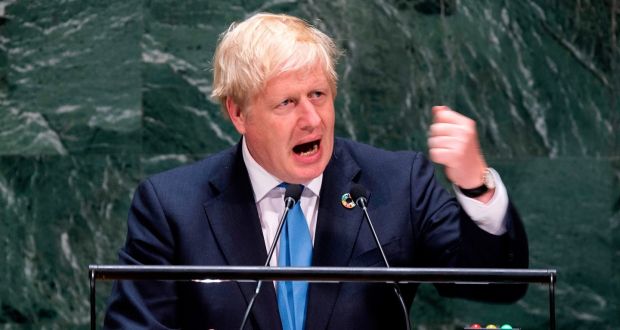Boris Johnson’s technological dystopia speech
In such a divided political landscape, mere association with a particular figure brings an automatic judgement on the basis of their profile rather than the message itself, which was why the speech delivered by Boris Johnson at the United Nations failed to get the headlines it deserved and was instead ridiculed by the media establishment.
The cartoonish yet controversial figure of the UK Prime Minister provokes an awkward shiver among his adversaries, and a cheeky grin from those who appreciate his entertainment value.
So when Johnson stood on the stage at the United Nations in October 2019 and gave a speech on the possibility of a technological dystopia through digital authoritarianism, it naturally brought about this automatic smear from his usual detractors.
The media response was that of a mocking nature, picking out some of the more peculiar phrases out of context to throw a cover over the main message of the 16-minute speech.
‘Pink-eyed terminators and limbless chickens: Boris Johnson’s UN speech in quotes,’ the Guardian titled its article.
‘5 Insane Quotes From Boris Johnson’s Bizarre UN Speech,’ Futurism said.
‘Boris Johnson delivers bizarre speech to UN warning of ‘terrifying limbless chickens,’ wrote The Independent.
However, for those who simply listened to the talk without personal judgement would have picked up on the key messages that Johnson put forward.
Johnson warned of mass surveillance of the general population through advancements in technology, and should such power fall into the wrong hands, it could have catastrophic consequences, signing off with a hint of optimism that tech can solve the world’s leading problems when the right structure is in place.
It is important to put judgments aside and unpack the overall message which, under close scrutiny, echoes what has been warned by leading experts in the field.
Despite being delivered in BoJo’s typical cartoonish fashion, the message carried weight and the main points stand up to what is already happening in the digital world.
Who is in control in the digital age?
“No-one can ignore a gathering force that is reshaping the future of every member of this Assembly. There has been nothing like it in history,” Johnson began.
“When I think of the great scientific revolutions of the past – print, the steam engine, aviation, the atomic age – I think of new tools that we acquired but over which we – the human race – had the advantage.
“Which we controlled.
“That is not necessarily the case in the digital age.”
A handful of private tech companies now dominate the agenda when it comes to matters of information, privacy and speech, with a supranational legal standing to deny access to services to users according to its own ideology, a kind of power over the masses that dictatorships of the past could only have dreamt of with access to over 50 percent of the world’s population.
Google surveillance
“You may keep secrets from your friends, from your parents, your children, your doctor – even your personal trainer – but it takes real effort to conceal your thoughts from Google.”
This one requires no explanation.
Smart cities
“Smart cities will pullulate with sensors, all joined together by the ‘internet of things’.”
Today, there are over 1,000 smart cities ready or under construction, in which thousands of sensors are installed in an urban space, on anywhere from lamp-posts to cars, in order to capture real-time data. This is no secret.
While smart cities promise solutions to sustainable living, reduced traffic, and less crime, the social and political threat that comes hand in hand with the contentious privacy aspect of these smart cities and their infringement on civil liberties cannot be understated.
Surveillance capitalism
“We are ourselves becoming a resource. Click by click, tap by tap. Data is the crude oil of the new economy.”
Surveillance capitalism is the term coined by Harvard Professor Shoshana Zuboff to explain how the individual’s processes and actions are used by tech giants to profit from our habits which are ever-more engineered by the very same companies.
“Surveillance capitalism unilaterally claims human experience as free raw material for translation into behavioural data,” Zuboff states.
Social credit system
“Can these algorithms be trusted with our lives and hopes? Should the machines decide if we are eligible for a mortgage or insurance?”
One of the consequences of not being a reputable citizen in China, in accordance with the state-imposed social credit system, is indeed the rejection of loans and insurance.
But this is not just happening China, with many companies in the West are already contributing to a similar system. New guidelines released by the New York’s Department of Financial Services (NYFS) rule that it will allow life insurance companies to use data from customers’ social media posts to determine their premiums.
“We already use all kinds of messaging services that offer instant communication at minimal cost.
The same programmes, platforms, could also be designed for real-time censorship of every conversation, with offending words automatically deleted, indeed in some countries this happens today.
Digital authoritarianism is not, alas, the stuff of dystopian fantasy but of an emerging reality.”
The major social networks are already deplatforming users for their political views, and the likes of Facebook and Amazon have aligned with political think tanks and government agencies to curb certain types of speech online.
“But how we design the emerging technologies behind these breakthroughs – and what values inform their design –will shape the future of humanity. That is my point to you tonight my friends.
“At stake is whether we bequeath an Orwellian world, designed for censorship, repression and control, or a world of emancipation, debate and learning, where technology threatens famine and disease, but not our freedoms.”
Far from a ‘bizarre’ claim, we are indeed shifting ever more towards the scenario played out in George Orwell‘s dystopian novel 1984, and it is up to the people to decide or consent to whom will be in charge, and how much power were are willing to cede for the sake of convenience.
This is precisely why there are such concerns over smart cities, as it is the companies supplying the 5G data on which they run, such as Huawei and Google, who write the rules on data protection and privacy, above state law.
Clara Alves Rodrigues’ wrote in her peer-reviewed paper ‘Digital Gangsters’ that it is “unavoidable to create public-private partnerships to keep up with state-of-the-art ideas and systems” and “the protection of human rights is therefore left in the hands of who designed the smart city”.
So in the case of China, for example, where it is dominating the 5G market in Europe, the laws that its data companies impose effectively ride above the liberal democracies of the old continent.
Had it been a trendy hipster repeating the exact same speech at a TedX conference, it would have been shared by the millions.
Instead, the media establishment, hand in hand with big tech, have demonstrated their striking partnership by shutting down a sound caution towards how we approach one of the greatest challenges of our time.
Google’s algorithmic bias pushes mainstream sites to the front page of its search engine and they return the favour by associating ridicule with the speech as oppose to serious alarm towards big tech companies.
It’s almost like something Boris could have hinted at in that speech.
“We need to find the right balance between freedom and control; between innovation and regulation; between private enterprise and government oversight.
“We must insist that the ethical judgements inherent in the design of new technology are transparent to all.
“And we must make our voices heard more loudly in the standards bodies that write the rules.
“Above all, we need to agree a common set of global principles to shape the norms and standards that will guide the development of emerging technology.”




